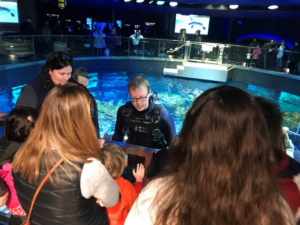Visitor Engagement
The Ocean Project is currently collaborating with our network Partners -- zoos, aquariums and museums (ZAMs) -- in support of the goal of 30x30 and the need for strong science-based fisheries management, building upon extensive experience gained from earlier efforts including the Innovative Solutions Grants+ Program.
Research by The Ocean Project and others has underscored the ways in which ZAMs are uniquely positioned to engage the public, inform policymakers, and advance ocean conservation. Most recently, starting in 2017, we launched a new initiative to support ZAMs in getting more involved to effectively inform science-based federal fisheries policy and advance action for healthy sustainable marine ecosystems. This initiative is funded in part by the Gordon and Betty Moore Foundation.
Please contact us if your zoo, aquarium, or museum is interested in participating in either campaign, or another effort to engage the public and advance ocean conservation.
30x30
The 30x30 campaign is centered around a global goal of protecting 30% of our land and ocean by 2030. With thanks again to the Gordon and Betty Moore Foundation, and with an ocean messaging grant from Heartwired to Love the Ocean we were able to work with the Aquarium Conservation Partnership (ACP) and field test the messaging at four aquariums - Aquarium of the Pacific, New England Aquarium, New York Aquarium, and Shedd Aquarium – with an interest in advancing support for marine protected areas (MPAs) and a commitment to including and engaging diverse audiences. We are now working in ongoing collaboration with ACP and the Association of Zoos and Aquariums (AZA) to encourage our other ZAM partners to adopt some of those successes.
Download our latest resource on the 30x30 campaign for ZAM partners:
30×30 Toolkit for Aquariums and Zoos
Check out some of our webinars related to the 30x30 campaign below:
- #19 Protecting 30% of Our Blue Planet by 2030 (Part 1)
- #20 Protecting 30% of Our Blue Planet by 2030 (Part 2)
- #24 Emerging Opportunities to Advance 30x30
- #25 Effective Conservation Engagement
Science-Based Fisheries Management
Ocean conservation is at an important juncture in many ways, including in the U.S. with the anticipated reauthorization of the nation’s primary law governing management of our fisheries, the Magnuson-Stevens Fishery Conservation and Management Act (Magnuson-Stevens Act).
Building on a strong foundation of public opinion research and lessons learned from other efforts with its partners, The Ocean Project worked with six leading aquariums to develop effective ways to inform visitors about the important role that a sound, science-based approach can play in protecting, even improving the health of fish populations and fisheries, while still ensuring that visitors enjoy their time on site.
To help engage ZAM visitors on fisheries and related conservation policies, download the
Guide to Effectively Engaging the Visiting Public in Fisheries Policy
Check out some of our webinars related to the fisheries campaign below:
- #3 Fishing for Public Engagement
- #10 Bringing the visiting public into public policy
- #11 Improving Management & Conservation- Forage Fish
- #18 Ensuring Science-Based Fisheries Policies
Prior Campaigns:
Since our founding in the 1990s, The Ocean Project has collaborated with others to inform and support our network of partner ZAMs to get involved on policy issues, both individually and collectively, and on a variety of issues, from environmental education appropriations and climate change and ocean acidification, to protection of Antarctica and the Southern Ocean. Some our more substantial campaign examples include:
- Through funding from the National Oceanic and Atmospheric Administration (NOAA), The Ocean Project created the Innovative Solutions Grants+ Program and awarded approximately $400,000 in grants of up to $30,000 each to ZAMs. The grants also came with pro bono strategic communications coaching and technical expertise and amplification to catalyze peer-to-peer sharing and learning; see examples here.
- In 2016, we collaborated with 8 SEA LIFE Centers across the U.S. in both coastal and inland locations on a campaign focused on creation of MPAs. This campaign was based on a successful pilot that demonstrated visitor interest in expanding the U.S. network of MPAs.
- In 2017 we collaborated with UN Environment on a pilot campaign for World Oceans Day, to engage visitors at 12 ZAMs across the United States on plastic pollution.
Though we focused on U.S.-based ZAMs, some of the lessons learned are being applied globally. For more information on our work in recent years, feel free to check out our blog posts!

